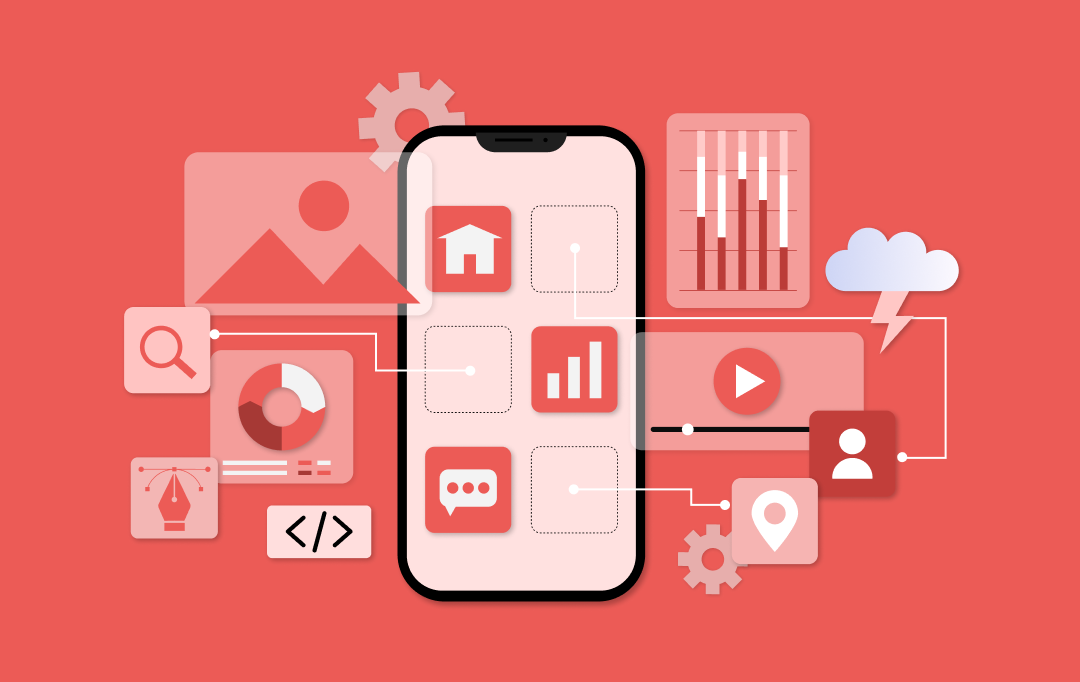- Introducing the concept of supplier relationship management (SRM) to business
- What is SRM software?
- Core features and use cases of the SRM business software
- 1. Supplier data management
- 2. Supplier risk management
- 3. Procurement management
- 4. Bidding and supplier selection
- 5. Supplier performance management
- 6. Supplier contract management
- 7. Cost management
- 8. Supplier portal
- Best practices for successful implementation of SRM
- 1. Value mapping
- 2. Spend optimization
- 3. Risk mitigation
- 4. Top-down approach
- Business benefits of SRM software system
- 1. Quality control and cost-saving
- 2. Compliance with relevant parameters
- 3. Growing supplier base management
- 4. Development programs for suppliers
- 5. Supplier self-service
- How can Appinventiv help you with SRM?
In today’s accelerating world economy, manufacturing enterprises are faced with the market realities of ever more demanding customers, steeping price erosion, and shrinking product life cycles. The digital transformation in supply chain management has made industries follow a rigid drive to cut costs and focus on core competencies constantly. The use of advanced technologies such as AI and Analytics in the supply chain sector help businesses understand the complex data but they are still lacking in post implementation maintenance. Not only this, over 30% of the supply chain management businesses believe in outsourcing some or all of their technical capabilities. Why is this happening?
Why are manufacturing and supply chain businesses highly reliable on technical outsourcing and strategic procurement when it comes to meeting customers’ demands?
There’s one answer to justify the above questions.
Supply chain and similar manufacturing enterprises need to manage close relationships with a large number of supply bases on a real-time basis. This is not just an advancement but a necessity to survive in a highly competitive market. That’s when Supplier relationship management (SRM) software comes into play.
Introducing the concept of supplier relationship management (SRM) to business
Suppliers are an integral part of the supply chain management process. If the suppliers are not monitored closely, the business harm could be up to any extent. You can suffer a delayed product launch, damaged brand image, penalties by regulatory authorities, and more.
To overcome such risks, supply chain enterprises and similar businesses follow the SRM system.
Supplier relationship management is a systematic approach to evaluate suppliers (or vendors) that supply goods, services, and materials to an organization, determine their contribution in the supply chain process, and develop a strategy to improve their performance. This concept applies to manufacturing industries and every enterprise that regularly deals with suppliers, especially in areas of operations and project management.
This may become a challenging task but not when businesses have SRM software to rely on.
What is SRM software?
An SRM software centralizes supplier-related data, helps update the fitting suppliers, analyzes their performance, and detects related risks to improve supply collaboration, planning, and management.
When we talk about the importance of the SRM system in supply chain and b2b businesses, there are two essential pillars to recognize
- Evaluate if the suppliers are performing as per the organizational needs
- Identifying areas of improvement while engaging with suppliers throughout their lifecycle
The above two factors primarily exhibit why businesses need a supplier relationship management system. Apart from these, srm management gets businesses most of the supplier’s service. With constant evaluation, communication and feedback, it’s much easier to work closely with the suppliers and generate quick solutions.
While we are talking about what the SRM system does, we also need to get familiar with how it does it. The SRM software system is packed with tons of tools and features that industries can leverage to yield successful results.
Core features and use cases of the SRM business software

1. Supplier data management
This involves features such as
- Document storage (transactions, business receipts, invoices, contracts with suppliers, certifications of suppliers with background checks, documents of suppliers’ compliance, etc.)
- Registration of suppliers and sub-suppliers, and contractors by self-registration or sourcing via supplier portal
- Automatic linking of the supported data record of all suppliers (for instance- all the background data, work history, and projects of a supplier are available on the supplier’s profile)
- Personal notifications on updates in supplier’s data or document
- Storage and tracking of all supplier data (current capacity and pricing, allotted location, ongoing operations, and previous company, etc.)
2. Supplier risk management
This involves features such as
- Real-time supplier risk mitigation and monitoring (financial and operational risks from the public/private data sources detected by Artificial Intelligence).
- Automatic risk alerting (on any operational risk exposure)
- Detailed dashboard (with an overview of overall risks involved, per risk factor, the possibility of risk as per supplier’s data, etc.)
- Current supplier compliance regulatory check
3. Procurement management
This includes features such as
- Quick doc based creation of purchase requisitions and orders
- Creation and management of allotted suppliers list (for instance- supplier assignment by project specialist to a specific service or location based on data insights)
- Supplier status tracking for purchase orders and requisitions
- Tracking of execution order (can be done for multiple tiers and sources)
- Automated three-way matching process (order receipts, purchase orders, and suppliers invoice). This is done to avoid any inconsistencies.
- Communication tools to discuss orders with specialists and suppliers
4. Bidding and supplier selection
This includes features such as
- AI-based status pre-qualification tools (for assessing financial stability, risk of supply disruptions, regulatory compliance, etc.)
- Automated sourcing event approval workflow
- Supported collaboration with department managers on supplier nomination and selection
- Setup of supplier compliance requirements (capacity, sustainability, delivery terms, quality standards, etc.)
- Form-based creation of events, auctions, and tenders
- Supplier bid comparison
5. Supplier performance management
This includes features such as
- Accessible dashboards with a supplier activity overview
- Automated alerts on disrupting supplier performance
- Supplier segmentation (based on engagement level and performance)
6. Supplier contract management
This involves features such as
- contract status tracking
- Automated contract renewal
- Template-based creation of supplier’s contract
7. Cost management
This includes features such as
- Cost limits setups (per supplier/department)
- Real-time spend analysis
8. Supplier portal
This involves features like
- Supplier catalog editing and updating
- Supplier forum with Q/A sections and files
- Template-based and custom supplier surveys creation (for suppliers feedback)
The above supplier relationship management software features are more than enough to manage the entire supplier base chain and fulfill the organizational needs. But the applicability of the SRM system doesn’t end here. Enterprises are well aware of the supremacy of custom software development but they often neglect the importance of post-deployment practices that could save them from a number of challenges.
Enterprises need to strategize the implementation of the SRM system in their business. Even after you seek software development services, one factor you must always focus on is the supplier relationship management strategies.
Best practices for successful implementation of SRM

Supplier relationship management guides an organization about the strategies that run the entire lifecycle of the suppliers. Although many enterprises have their SRM process in place, most often, there is always a scope of improvement when it comes to dealing with suppliers.
Below are the five most preferred supplier relationship management practices the industry experts follow.
1. Value mapping
Many organizations primarily focus on cost-cutting post implementing supplier relationship management tools. Businesses can go beyond the expense factor and work on value drivers such as revenue growth, risk reduction, and asset utilization through the value mapping concept.
A successful value mapping can be done by placing mutual understanding, trust, and communication with suppliers to derive tangible business values. A structured and well-planned srm practice can help you extract the most out of the system.
2. Spend optimization
Now, cost and expenses are what keep your business healthy and running. Supplier relationship management practices like reduced inventory, collaborative supply chain analysis, joint demand management, and total modeling cost help you in optimizing the total business expenses. How, if you ask? The mentioned practices focus on delivering the cost-cutting initiatives and can bring down the expenditure graph for the short term.
3. Risk mitigation
Enterprises of all scales and sizes suffer from supply chain disruption at some point of time. The disruption could be due to price volatility, product or service quality issues, and third-party dependency issues; however, SRM tools can easily predict and manage these risks. A supplier relationship management system also helps you with automating the procurement process. The practice of mitigating risk and encountering a solution that benefits the value chain is highly followed in the supply chain enterprises.
4. Top-down approach
A successful SRM strategy is all about craftsmanship; therefore, it can not be achieved without onboarding the specialists and stakeholders in your process. Your SRM strategy implementation must start from the top rank and move down through managers and staff members. An effective SRM process keeps everything in the loop, from paperwork and people to operations. Combined with a standard SRM system, these strategies can work wonders with supply chain management and bring you unlimited benefits. Now that we are talking about the business benefits let’s explore more.
Business benefits of SRM software system

An SRM software does more than just manage the supplier base. There are a number of benefits in pursuing SRM best practices and strategies for your business. Some of the significant ones are discussed below.
1. Quality control and cost-saving
Having a strong supplier relationship management process in your organization results in timely identifying cost-saving opportunities and scrutinizing the quality of supplier control. This directly contributes to the quality and cost factor and impacts the bottom line of the business.
2. Compliance with relevant parameters
Every supplier in the organization needs to fulfill a certain set of parameters to work efficiently. Through SRM, these parameters can be studied to analyze the supplier’s performance. This way, you can figure out if your business is getting the most value out of the supplier or not.
3. Growing supplier base management
A myriad of factors like increase in the operation scale, broad access to global suppliers, enhanced complexity of supply chain, etc., contribute to growing supplier base.
As the suppliers keep engaging with various organizations, it’s not just challenging but also impossible to manage the entire supply chain without an effective SRM process. SRM provides a 360-degree view of the entire supplier database to upgrade management.
4. Development programs for suppliers
Once you evaluate suppliers and their areas of improvement, supplier relationship management software can also help you design various development programs to support your suppliers. These programs cater to organizational needs and requirements and can act as a catalyst for fulfilling long-term needs.
5. Supplier self-service
Among all the above benefits, the most significant advantage of a supplier relationship management system is that it gives the power to your suppliers to manage their own data. They can create their own profiles, spot and assess new supplier partners, update order details, and track payments using a collaborative platform.
Besides these, SRM also supports supplier responsiveness, supply chain continuity, and long-term visibility. All these benefits directly contribute to the growth of the organization.
How can Appinventiv help you with SRM?
Whether you are just stepping into the supply chain business or looking to enhance your existing supply chain process, having a standard SRM system is crucial to all. When it comes to seeking enterprise software development services, you need a reliable source to guide you through the technical aspects of your business requirements.
Appinventiv not only helps you with technical insights but can also integrate SRM software and tools with your workflow successfully. You can efficiently address pressing issues such as low engagement, less transparency, supply risk, and less ROI.
Talk to us to know more.


- In just 2 mins you will get a response
- Your idea is 100% protected by our Non Disclosure Agreement.

Why Enterprise Application Security is Mission Critical and How to Get it Right
Key takeaways: Enterprise applications are increasingly complex, spanning cloud-native architectures, APIs, and third-party integrations, which broadens the attack surface. Adopting DevSecOps and embedding security early in the development lifecycle reduces breach impacts by up to 30%, proving proactive security integration is vital. Regulatory compliance, business continuity, and customer trust hinge on effective application security strategies…

How Custom Enterprise Apps Are Powering Dubai’s 2040 Vision for Smart, Sustainable Growth
Key takeaways: Custom enterprise app development in Dubai is crucial for realizing the Dubai 2040 Vision smart city goals. Custom enterprise apps are fundamental to realizing Dubai's vision for a smart, sustainable future, integrating technology into every urban facet. Smart city apps in Dubai leverage IoT, AI, and cloud technologies to create integrated platforms managing…

Enterprise Application Integration – How It Works and Why It Matters to Your Business
In the fast-paced corporate world, CEOs and CTOs are often tasked with managing multiple systems and departments, each playing a crucial role in the success of the company. But what happens when these systems don’t communicate effectively with one another? Imagine your sales team's inability to instantly share data with your inventory management or customer…

















